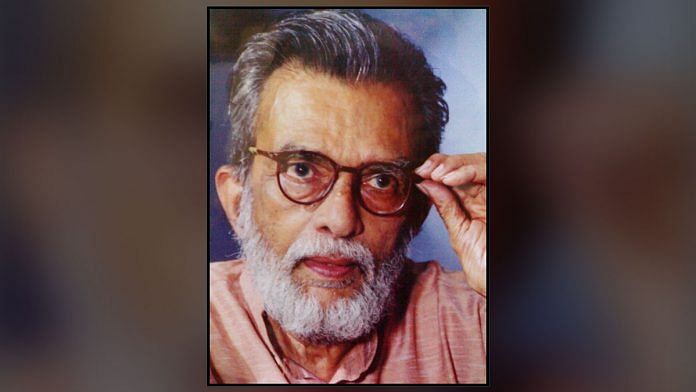New Delhi: Babukodi Venkataramana Karanth may not be a name recognised by most millennials but this rebel revolutionised Indian theatre, specifically South Indian theatre.
National Award-winner, former director of the National School of Drama, director, musician, actor, writer and more – B.V. Karanth donned multiple hats in his lifetime and will always be remembered for his invaluable contribution to each of those fields.
An early theatre enthusiast
Karanth was born in Manchi, Karnataka on 19 September 1929 and got involved in theatre early in life.He appeared on stage for the first time at the age of eight, in a play called Nanna Gopala, directed by veteran director P.K. Narayana.
Soon after, he joined the Gubbi Theatre Company, which was started by renowned thespian Gubbi Veeranna who was responsible for putting Kannada theatre on the map. Under the aegis of Veeranna, he went on to pursue a Masters in Arts and also trained in Hindustani music, in Benaras.
He married fellow theatre aficiando, Prema Karanth, who went on to become the first female director in Kannada cinema.They supported each other through their education and took turns to work. While Karanth studied in NSD, his wife supported him by working as a teacher. After he graduated in 1962, she went on to study drama, while Karanth took up teaching. The two formed a formidable couple in the theatre world.
A pillar of South Indian theatre
In 1974, Karanth founded the theatre group Benaka, now considered one of the pillars of South Indian stagecraft. Karanth’s most famous plays were performed by Benaka, like Sattavara Neralu, Hayavadana, Jokumaraswamy, Kattale Belaku and even Shakespearean plays such as Hamlet.
All of these plays ran for at least 200 shows and really exemplified Karanth’s genius. His plays may not have been stylistically impressive but his use of music, to bring out emotion and subtext, left the audience spell-bound. They would centre on human nature and emotion, mixed with mythology and folklore.
Karanth branched out to the cinema in the 1970s. He directed films like Vamsha Vriksha– starring Girish Karnad, who also co-directed the movie. His movies were critically acclaimed and he won a total of six National Awards for direction and music.
As Director of NSD
Karanth’s other major contribution towards theatre came in 1977, when he became the director of the National School of Drama, Delhi. Playwright-director and successor to Karanth, Prasanna remembers the effect Karanth had on NSD as phenomenal. “Karanth turned the NSD upside down. He did wonderful things that were never done before,” he said in an interview.
“He believed that in a country like India, with incredible talent and traditions of theatre, NSD had to take theatre out to inaccessible areas. So he started an extension programme and we were all sent out. I was camp director of a workshop in Bihar. He did a 40-day workshop in Gandhigram (in Madurai), Tamil Nadu,” Prasanna said
Karanth travelled all over the country, sometimes with his wife, and set up workshops and other outreach programs to encourage folk theatre. It was a mission that he carried forward after stepping down as director.
In 1981, he was invited by the Madhya Pradesh government to head the Rangamandal repertory, under the Indian government. Here, again, he completely turned things around by bringing the state’s folk theatre to the masses. Scores of people would line up to watch plays in local dialects Bundelkhandi, Malavi and Chhattisgarhi, and these had folk performers and crews for the first time.
A scandal
Misfortune struck in the form of scandal when Karanth was charged with the attempted murder of actor Vibha Mishra in 1986. The two were allegedly having an affair at the time. Mishra was found horribly burnt in her home one night, and witnesses identified Karanth as the last person to be seen in her home.
She was treated for third-degree burns, while Karanth was jailed and interrogated for a month. He was later cleared of all charges, when Mishra finally gave a statement saying it was an accident. He was, however, forced to move back to Karnataka after the incident.
A prolific career
In 1989, he was asked by the Karnataka government to head another repertory in Mysore — Rangayana. He was the director of the theatre institute till 1995.
He was later diagnosed with prostate cancer but kept on working at Benaka and composing music for films.
He passed away on 1 September, 2002.
In his lifetime, Karanth built a versatile and prolific portfolio — he directed close to 150 plays in Kannada, Hindi, Tamil, Telugu, Gujarati, Malayalam and Urdu.
Lakshmi Chandrashekhar, a leading theatre artist and critic, put it best when she said,“Karanth offered ‘complete’ theatre, where colour, music, dance, narrative and strong intellectual content merged. He brought people back to the theatre.”
Also read: Poet Mahadevi Verma and her undiscovered feminist legacy



